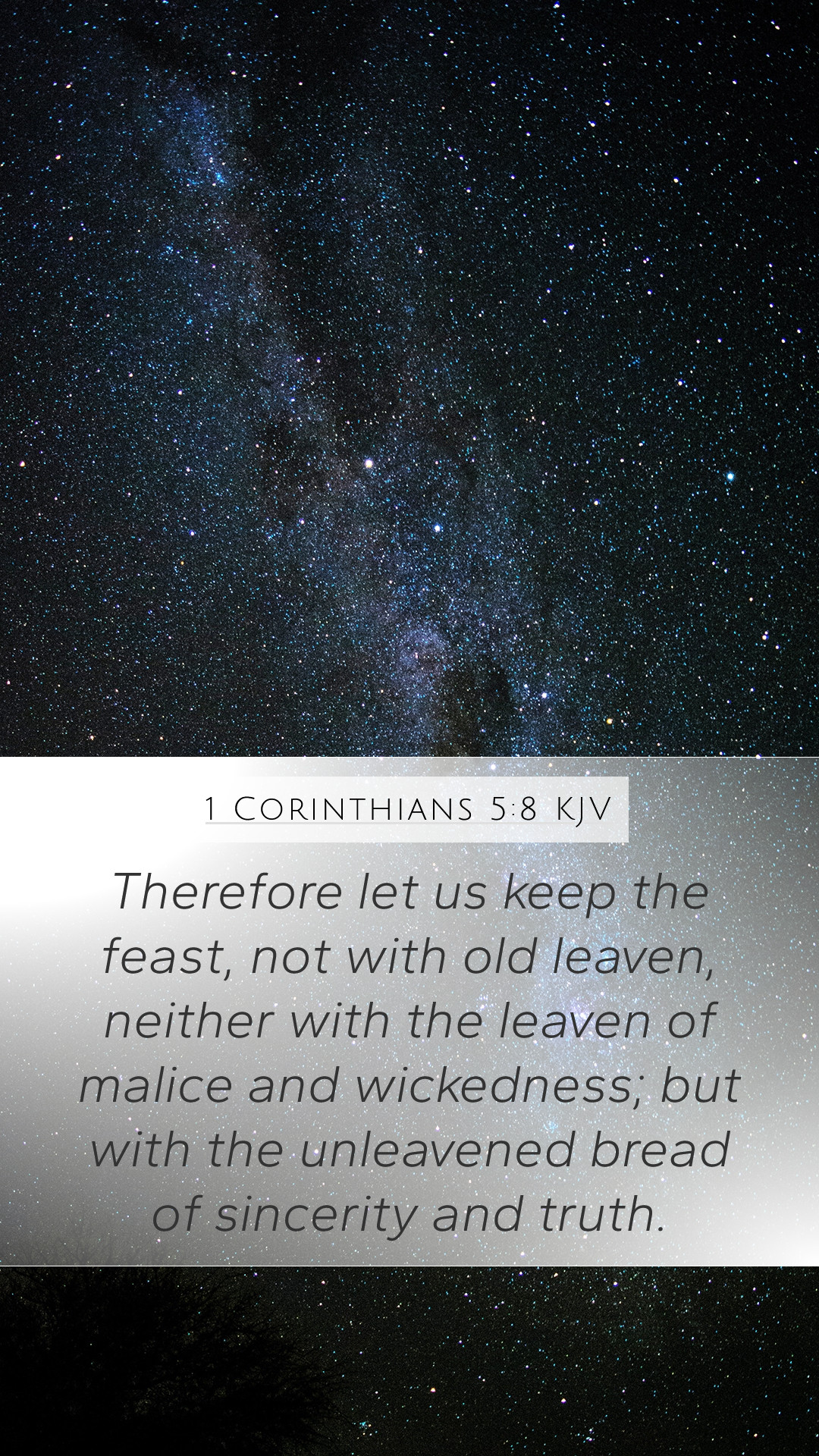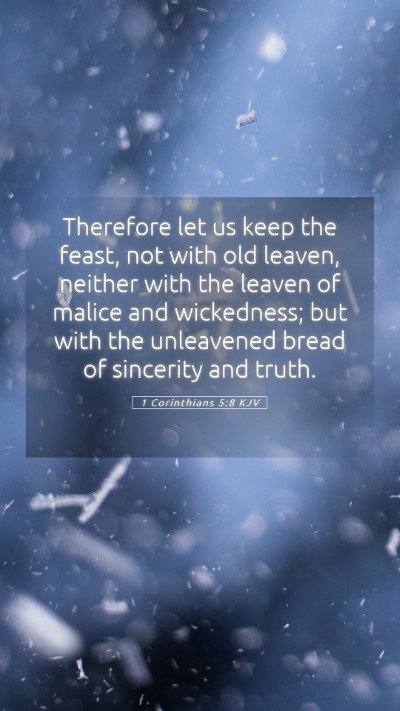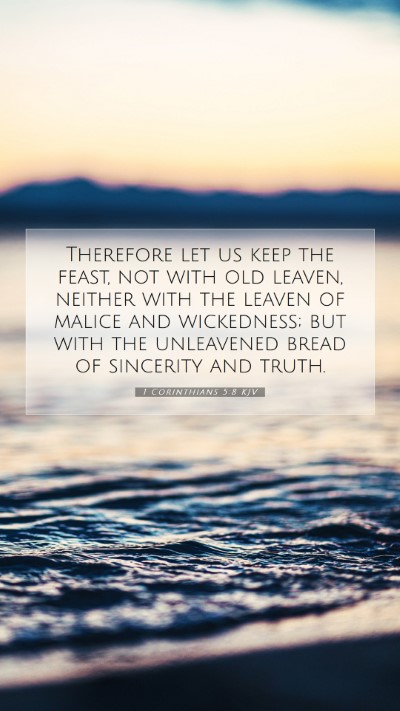Old Testament
Genesis Exodus Leviticus Numbers Deuteronomy Joshua Judges Ruth 1 Samuel 2 Samuel 1 Kings 2 Kings 1 Chronicles 2 Chronicles Ezra Nehemiah Esther Job Psalms Proverbs Ecclesiastes Song of Solomon Isaiah Jeremiah Lamentations Ezekiel Daniel Hosea Joel Amos Obadiah Jonah Micah Nahum Habakkuk Zephaniah Haggai Zechariah Malachi1 Corinthians 5:8 Meaning
What is the meaning of 1 Corinthians 5:8?
Therefore let us keep the feast, not with old leaven, neither with the leaven of malice and wickedness; but with the unleavened bread of sincerity and truth.
1 Corinthians 5:8 Bible Verse Meaning
Understanding 1 Corinthians 5:8
Bible Verse: 1 Corinthians 5:8
Verse (KJV): "Therefore let us keep the feast, not with old leaven, neither with the leaven of malice and wickedness; but with the unleavened bread of sincerity and truth."
Overview of 1 Corinthians 5:8
This verse encourages believers to live a life of purity and sincerity, contrasting the old ways associated with sin and malice with the new life found in Christ. It signifies a call to celebrate the Passover (symbolizing salvation and freedom) with a heart aligned to God's truth rather than being tainted by past wrongs.
Commentary Insights
This section summarizes insights from notable public domain commentaries including those by Matthew Henry, Albert Barnes, and Adam Clarke.
Matthew Henry's Commentary
Matthew Henry emphasizes the importance of sincerity over hypocrisy. He explains that the "feast" refers to the Christian practice of communion, urging believers to remove sin (represented as leaven) from their lives. True worship requires a heart and mind free from malice, ensuring that we celebrate God's mercy and grace sincerely and truthfully.
Albert Barnes' Commentary
Albert Barnes discusses the metaphor of leaven as it relates to sin. He notes that just as leaven can spoil bread, so can malice and wickedness spoil our relationship with God. Barnes underscores that believers are called to embrace a new life characterized by "unleavened bread," which symbolizes purity and sincerity in faith and conduct, moving away from past sinful behaviors.
Adam Clarke's Commentary
Adam Clarke highlights the historical context of the Jewish Passover, where unleavened bread symbolized purity and an escape from sin during the Exodus. He draws parallels to the Christian faith, illustrating that the believer's life should reflect the same purity that the unleavened bread represents. Clarke invites readers to consider the significant transition from the old ways of malice to living in alignment with Christ’s teachings.
Implications for Believers
1 Corinthians 5:8 serves as a profound reminder for Christians to continuously evaluate their lives against the standards of sincerity, truth, and purity. It calls the church to uphold a communal standard that encourages accountability among believers, fostering an environment that nurtures growth in faith.
Cross References
- Matthew 16:6: "Then Jesus said unto them, Take heed and beware of the leaven of the Pharisees and of the Sadducees."
- Galatians 5:9: "A little leaven leaveneth the whole lump."
- Exodus 12:15: "Seven days shall ye eat unleavened bread; even the first day ye shall put away leaven out of your houses."
- 1 Peter 2:1: "Wherefore laying aside all malice, and all guile, and hypocrisies, and envies, and all evil speakings."
- Romans 6:13: "Neither yield ye your members as instruments of unrighteousness unto sin: but yield yourselves unto God, as those that are alive from the dead, and your members as instruments of righteousness unto God."
Application to Daily Life
Understanding and applying the lessons from 1 Corinthians 5:8 is crucial for fostering a genuine spiritual life. Here are some practical applications:
- Self-Examination: Regularly assess your heart and actions against the teachings of Christ.
- Community Engagement: Encourage each other in faith by holding accountability within Bible study groups.
- Spiritual Growth: Focus on sincerity in worship and service to foster true community and love.
- Embrace Transformation: Acknowledge the power of Christ's redemption to overcome past sins.
Conclusion
In sum, 1 Corinthians 5:8 offers believers a profound invitation to celebrate their faith in sincerity and purity, moving beyond the past into a life aligned with the truth of the Gospel. By embracing this call, believers not only honor God but also enrich their communal worship and personal spiritual journeys.
Further Study
For those looking to deepen their understanding of this verse and its implications, consider exploring additional Bible study resources, online courses, or group discussions. Engaging with Scripture in various forms can lead to richer insights and applications of the teachings found within.


